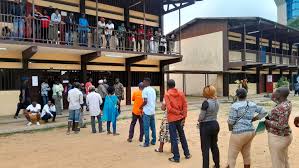
Gabonese citizens went to the polls on Saturday, September 27, to elect members of the National Assembly and local councils, in a vote closely watched after April’s presidential election, won decisively in the first round by General Brice Clotaire Oligui Nguema.
According to the Ministry of the Interior, more than 18,800 candidates competed for 3,223 seats nationwide, including 145 in the National Assembly and 3,078 at the local level. Ahead of the vote, the electoral rolls were updated with 156,445 changes, encompassing 18,170 new registrations, 124,472 adjustments to polling stations, 617 deletions, and 13,682 other modifications.
The campaign for the first round, which began on September 17, concluded Friday evening, while the second round is scheduled between October 1 and 10. To maintain public order, the Ministry temporarily closed drinking establishments nationwide from 11:30 p.m. Friday until midnight Saturday.
Despite extensive preparations, the opposition group Together for Gabon, led by former Prime Minister Alain-Claude Bilie-By-Nze, denounced the elections. In a press release issued on September 26, the party claimed there were “serious attacks” on the electoral rights of the diaspora and called for a postponement of the vote. Bilie-By-Nze, who placed second in the presidential election, criticised the organisational conditions, citing the unavailability of proxies and a lack of transparency in the composition of polling stations.
President Oligui Nguema, however, reaffirmed his commitment to the electoral calendar, stressing that these elections represent a crucial step in Gabon’s ongoing political transition.
Analysts note that the vote is being closely observed both domestically and internationally, given concerns about transparency and the potential for unrest. The outcome of this first round will shape the political landscape ahead of the final round and set the tone for governance at both national and local levels.
Observers also highlighted the tension between a government determined to maintain the electoral timeline and opposition groups questioning the fairness of the process, reflecting a broader struggle over political legitimacy in the country.



